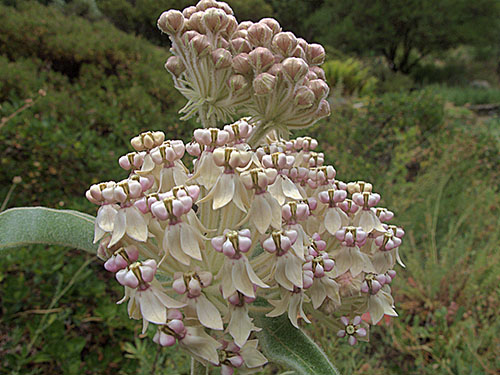
Kotolo Milkweed is also called Indian Milkweed and Woollypod Milkweed. Milkweed is necessary for monarch butterflies in all stages of growth. This plant is a tall perennial with clusters of bluish-white and pale lavender flowers. It will bring beauty and butterflies to your drought-resistant garden.
Habitat
Kotolo Milkweed is native to California, growing in the chaparral, meadows and woodland clearings. It needs full sun but isn’t picky about soil. It can grow in rocky soil, sandy soil and clay.
Home to the Monarch
Plant Milkweed to help the declining monarch butterfly population. It hosts the monarch from birth through the caterpillar stage and then feeds the adult butterfly.
Monarch butterflies lay their eggs on Milkweed plants. The caterpillars eat the foliage, so holes in the leaves are to be expected. Using pesticides or other chemicals will be counterproductive.
Monarch caterpillars live on the plant and spin their cocoons there. You can expect to see three generations of adult monarchs from about the end of April through July.
Destruction of Milkweed habitats is one of the factors involved in the decreasing numbers of monarchs. If you’re planting a bird and butterfly garden, Kotolo Milkweed should be at the top of your list.
In the Garden
Kotolo Milkweed is toxic to humans and household pets. It’s not a flower for cut bouquets. Take particular care to keep children and pets away from the hairy pods that develop after the plant’s flowering season.
Milkweed’s flowers attract hummingbirds as well as butterflies. It grows to a height of about three feet, making it perfect to plant directly around the birdbath. Butterflies require water as well as nectar. You can then put shorter flowering plants around the Milkweed and edge it with pebbles or even small boulders to create a barrier.
This variety often grows close to pines in the wild, so you can plant it close to them as long as it gets sun. It’s also found near oaks and growing alongside Sagebrush.
Water and Temperatures
Water this plant twice a month during the summer, preferably at the base to avoid damage to monarch cocoons.
Milkweed is very tolerant of temperatures below freezing.
Things to Remember:
• Milkweed is the host plant of monarch butterflies
• It requires full sun
• This plant is toxic to humans and pets
Due to Kotolo Milkweed’s unique characteristics, it’s best to work with a landscaper when deciding where to place it. Contact us today to start designing your butterfly garden.
